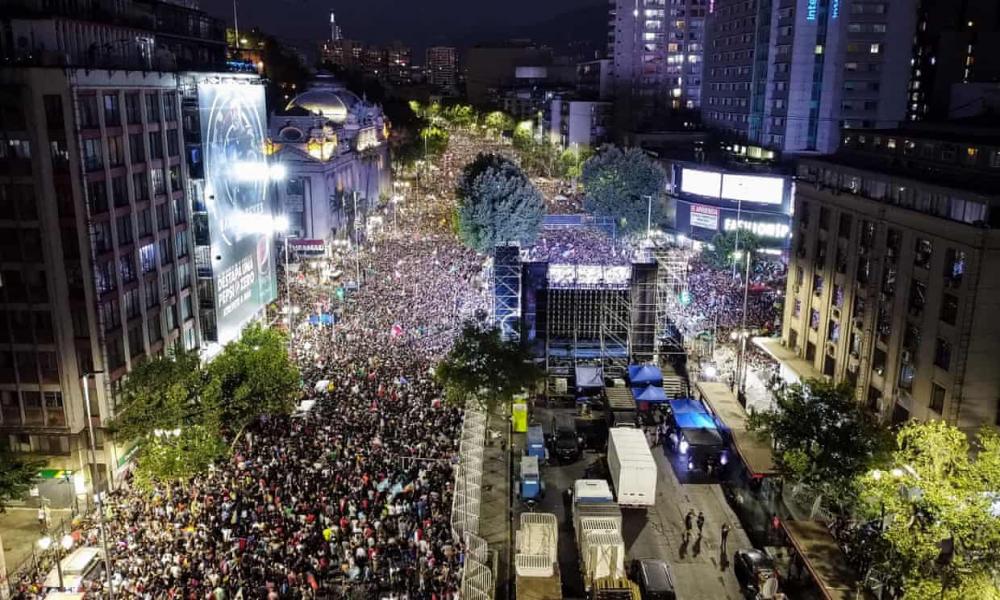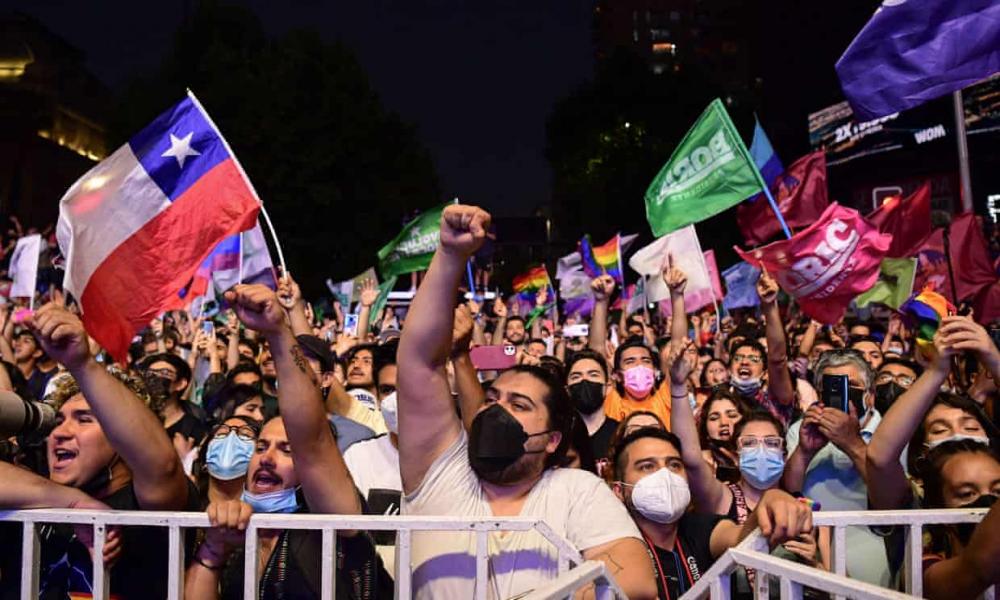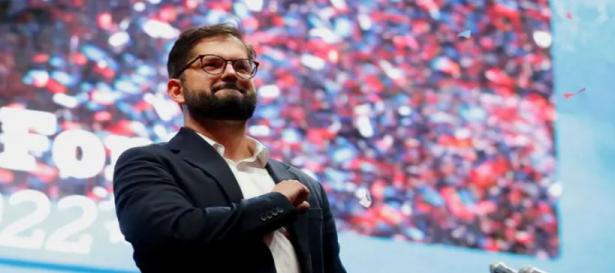Gabriel Boric has vowed to unite Chile, fight “the privileges of the few” and tackle poverty and inequality after winning a decisive victory over his far-right opponent to become the South American country’s youngest premier.
The 35-year-old leftwing former student leader won 56% of the vote in Sunday’s second-round presidential election, cruising past his ultra-conservative opponent, José Antonio Kast, who took 44.2%.
The triumph of Boric, who belongs to a generation deeply opposed to the extreme economic model bequeathed to Chile by the Pinochet dictatorship, comes two years after a rise in metro fares triggered huge protests and demands for drastic changes to the political and economic system.
The president-elect, who will be sworn in on 11 March, said the time had come for a radical overhaul of Chilean society and its economy.
“Men and women of Chile, I accept this mandate humbly and with a tremendous sense of responsibility because we are standing on the shoulders of giants,” he said in front of a vast crowd packed into a Santiago boulevard.
“I know that the future of our country will be at stake next year. That is why I want to promise you that I will be a president who will take care of democracy and not jeopardise it, a president who listens more than he speaks, who seeks unity, who looks after people’s daily needs, and who fights hard against the privileges of the few and who works every day for Chilean families.”
Boric said his generation wanted to have their rights respected and not be treated “like consumer goods or a business”, adding the country would no longer allow Chile’s poor to “keep paying the price” of inequality.
He added: “The times ahead will not be easy … Only with social cohesion, refinding ourselves and sharing common ground will we be able to advance towards truly sustainable development – which reaches every Chilean.”
The new premier said he would be “the president of all Chileans … and serve everyone”.
Boric also highlighted the progressive positions that launched his improbable campaign, including a promise to fight the climate crisis by blocking a proposed mining project in the world’s largest copper-producing nation.
He also called for an end to Chile’s private pension system – the hallmark of the neoliberal economic model imposed by Augusto Pinochet.
Boric thanked each candidate in turn – including Kast – and reinforced his commitment to Chile’s constitutional process, a key consideration for many as the country embarks upon this latest chapter in a turbulent period of transition.
The new administration is likely to be closely watched throughout Latin America, where Chile has long been a harbinger of regional trends.
It was the first country in South or Central America to break with US dominance during the cold war and pursue socialism with the election of Salvador Allende in 1970. It then reversed course three years later when Pinochet’s coup ushered in a period of rightwing military rule that quickly launched a free-market experiment throughout the region.
Kast won the first-round vote on 21 November by 2 percentage points, but Boric was able to prevail on Sunday by expanding beyond his base in Santiago and attracting voters in rural areas. In the northern region of Antofagasta, where he finished third in the first round of voting, Boric trounced Kast by almost 20 points.
Ghosts and old divisions returned to haunt the bitterly fought campaign, during which Kast – who has a history of defending the military dictatorship – sought unsuccessfully to caricature his rival as a puppet of his Communist party allies who would upend Latin America’s most stable, advanced economy.
However, Kast proved unexpectedly magnanimous in defeat. After tweeting a photo of himself congratulating his opponent on his “grand triumph”, he visited Boric’s campaign headquarters to see the new president. Kast, a father of nine, also said: “Gabriel Boric can count on us.”
Chile’s outgoing president, the conservative billionaire Sebastián Piñera, held a video conference with Boric to offer his government’s full support during the three-month transition.
In Santiago’s subway, the flashpoint for the 2019 protests, young supporters of Boric waved flags emblazoned with the candidate’s name while jumping and shouting as they headed into the city centre for his victory speech.
“This is a historic day,” said Boris Soto, a teacher. “We’ve defeated not only fascism, and the right wing, but also fear.”
On a sweltering day in Chile, voting was marred by public transport difficulties across the country, although the government claimed it had done everything in its power to guarantee voters could reach polling stations.
Turnout for the vote – in which 1.2 million more people cast their ballots than in the first round – was nearly 56%, the highest level since voting ceased to be mandatory nine years ago.
Boric will become Chile’s youngest modern president when he takes office, and only the second millennial to lead in Latin America, after El Salvador’s Nayib Bukele. Only one other head of state, Giacomo Simoncini of the city-state San Marino in Europe, is younger.
“It’s impossible not to be impressed by the historic turnout, the willingness of Kast to concede and congratulate his opponent even before final results were in, and the generous words of President Piñera,” said Cynthia Arnson, the head of the Latin America programme at the Wilson Center thinktank in Washington.
“Chilean democracy won today, for sure.”
The markets reacted less enthusiastically, with Chile’s peso falling and its dollar-denominated stock index slumping 10% on Monday. The peso’s 2% fall left it down nearly 20% since Chileans elected a constitutional assembly dominated by leftwing and independent representatives in May to redraft the country’s market-oriented constitution.
The Associated Press and Reuters contributed to this report




Spread the word